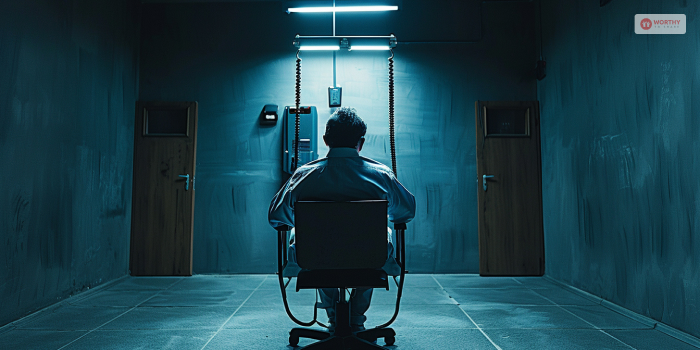Mass murderer vs serial killer!
What factors can explain the behavior of a person who commits such heartrending crimes? The psychological world of criminals, by and large, has mass killers and serial killers that mostly fascinate people with their cold and horrific moves.
However, why do we remember their crimes among the others?
Are they both similar, and are there differences which we missed out on?
They both have complicated minds, but is the psychology behind their purpose, and conduct the same?
Let’s discover the differences & similarities underneath the surface of these issues and try to find out what the darker side of human nature holds.
Are They the Same?

The words “mass murderer” and “serial killer” are usually considered the same on both popular and media platforms. But, between mass murderer vs serial killer, there are differences.
This starts with their crimes and their means.
Mass killers are individuals who kill more than one victim at a specific time by using different weapons and strategies.
This can be the case depending on the setting, such as schools, workplaces, or public spaces.
On the contrary, serial killers tend to be meticulous in their planning and impose their killings over certain periods. While mass murders happen because of sudden action or a common motivation of anger, they usually target a particular group or entire society.
Mass murderers are usually portrayed with a characteristic that is different from other types of killers.
Yes, they have no previous attachment to their victims. These assaults are typically quite unexpected. However, they are not always psychopathic unless we are considering mass shootings through terroristic acts.
Mass murderer vs Serial killer – The psychology behind mass murderers & Serial Killers (The Similarities)

Without a doubt, the psychology behind mass murderers has no one model that fits all since each case is so particular and elaborate. In the meantime, several major factors were found during investigations and research studies based on the previous case studies.
Childhood experiences or exposure to psychological stressors is one key psychological trait associated with mass murderers.
This is also true for many serial killers. These individuals grew up in a kind of abuse, and neglect, or even witnessed violence firsthand.
Such negative experiences can add up to emotional disbalance, including anger issues, jealousy, and resentment, alongside a lack of empathy towards others.
Besides, another salient feature that mass shooters tend to reveal is an underlying diagnosis of mental illness or a personality disorder.
On this account, people with psychopathy, or antisocial personality disorder, may have severe egocentrism. They even lack the slightest amount of regret or guilt for their actions. A need for omnipotence or conquest of all could be underlying reasons for the crimes committed by both.
Yes, they can believe they are superior to society’s norms and laws.
Mass Murderer vs Serial Killer – Difference in Their Crimes

When it comes to mass murders, everything is different, starting from the motive to their manners.
Here are some of the shocking differences between a mass murderer and a serial killer.
1. The Crime

Mass murderers generally kill more than one person in one setting. This could be educational settings, mass buildings like malls, cinema halls, or the theatre.
Serial killers, on the other hand, always ensure that their victims are alone before they strike.
2. The Motive

Mass murderers kill because they want to send a message to someone. However, the message can differ from person to person.
Religious terrorism is about inflicting fear on others stemming from the extremist idea of following one religion.
For school shooters, it could be years of pent-up anger and aggression toward the educational community or a group of people within the school vicinity.
In some cases, mass murderers can form a group to terrorize a particular community. This includes people from communities they do not like or want to be frightened. Some of the worst cases are mass shootings in gay bars or clubs from people who are not in support of the LGBTQ movement.
Serial killers, on the other hand, might have twisted motives. This includes profanity towards sexual abuse, sadism for causing cause, and even cannibalism.
Through many serial killer tapes, we have at least come to one conclusion. Once they start killing, they cannot help but crave the rush. The thought of seeing their victims in pain and begging for their lives exhilarates them.
Their motive always stems from psychopathy since they cannot moderate their emotions like a normal human being; getting an adrenaline rush through killing makes them want to go back for more.
3. Their Method

Mass murderers will simply pick up any method; their final goal is to kill as many as possible and create chaos.
However, serial killers prefer their weapons. It depends on what they try to do to their victim.
Unfortunately, the unlucky victims of serial killers’ death don’t find them quickly. They are often subject to sexual assault, torture, and even beating before they finally close their eyes forever.
Other than weapons to kill, they also carry other tools to create their entire murderous spree. Psychopaths caught as serial killers often called this method a form of art.
4. After Death

Once mass murderers are done killing their victims, they usually surrender or commit suicide. Since it is an unorderly anger, some mass murderers can even regret it and break down for their acts.
However, when it comes to serial killers, their methods get even more meticulous after the death of their victims, especially if they use profanity towards necrophilia.
Trigger Warning
Ted Bundy went back to the places where he dumped the bodies to fulfill certain sexual fantasies with the rotten bodies.
5. Escaping from the Law

When it came to escaping the law, these serial killers were masters. They hid every suspecting evidence, scraped, and rubbed every surface clean.
They were masterful at their approach of killing and hiding every piece of evidence. Some serial killers also have high NPD (narcissistic personality disorder). Therefore, they have even mocked the law by sending away clues and creating an air of attention against their names.
Some even say that getting caught for serial killers was often a choice rather than a matter of accident. Ted Bundy himself was able to escape from the Garfield County jail twice. Even crime enthusiasts often conclude that Ted was tired of the chase.
The same goes for someone like Ed Kemper, who is said to have an IQ of 145. He has the highest IQ among other serial killers and is also often suspected of surrendering because he was “bored” of hiding.
In fact, someone with such a high IQ could have hidden from authorities as long as they wanted. Ed Kemper confessed to his own crimes when he knew the police could not catch him no matter how many hints he gave.
6. Their Final Breathe

When it comes to mass murderers, you will find them often committing suicide or dying brutally through police encounters.
However, serial killers often die through execution or are sent to life imprisonment in prison.
Jeffrey Dahmer was beaten to death by another fellow inmate shortly after he was sentenced to life imprisonment without any chance of parole.
Mass murderer vs Serial killer Psychology Behind a Mass Murderer

Both mass murderers and serial killers suffer from mental health disorders, whether it is undiagnosed psychopathy, extreme anti-social behavior that indicates sociopathy, or unhinged sexual paraphernalia, including necrophilia, sexual sadism disorder, or voyeurism.
However, between mass murderer vs serial killer not all of them deal with the same form of mental disorder. These are some of the conditions commonly found in mass murderers.
Extremisms: Being at par with extremist ideas is something that makes mass shooters hold up a gun at someone. The most common ones are religious extremism, and any thought of “threat” to their religion can evoke violent tendencies. They take it upon themselves to protect their religion from contemporary infiltration or extinction.
Nihilism: On the other end of that spectrum is nihilism. This is a condition where someone is devoid of any religious or spiritual ideologies. Especially when they do not believe in supreme power and must face their final judgment, this gives them unhinged violent tendencies.
Depression: In cases of mass shootings in school, the child or teenager often deals with severe depression. They are often ostracized or even bullied. This leads them to a sense of doom or anger towards the world. These people are also suicidal but try to capture drastic attention through mass murder.
Substance Abuse: 23% of mass shooters who deal with depression also have substance abuse. This also gives them a sense of distorted reality.
Some mass shooters do have a conscience. They often understand what they did was wrong, and this is when they commit suicide. On the other hand, when it comes to mass shooters who have a grandiose sense of self, they often believe themselves as vigilantes doing justice to the world. This is where remorse is not a common afterthought.
Mass Murderer vs Serial Killer – Psychology of A Psychopath

The mind of a psychopath is quite different than that of a mass shooter. Here are some of the psychological disorders which distort their normal neurological functioning.
Psychopathy: Most serial killers in the history of time have been diagnosed with psychopathy. This includes Ted Bundy, BTK Killer, and Charles Manson. This is where their lack of remorse stems from. It is said that psychopaths cannot show empathy towards anyone. They are devoid of a sense of guilt and remorse. Therefore, all those murders were easier for them.
Sociopathy: Not every serial killer falls under psychopathy. Some fall under sociopathy. Which leads to extreme anti-social behavior. One of the most famous examples is Jefferey Dahmer. Unlike psychopaths, he did not have a natural tendency to charm his victims. He was anti-social in most of his endeavors and preferred spending his time alone.
Sadistic Sexual Disorder: This is another common disorder found in serial killers who also have sexual tendencies towards their victims. The thought of causing sexual pain to their victims often leads to their own arousal. Common examples are BTK Killer and Ted Bundy.
NPD: Narcissistic personality disorder is found in some serial killers who have a grandiose sense of self. They crave attention and often send out clues to law enforcement about their crime. The thought of receiving national attention and being part of that chase feeds their ego. For example, BTK killer, the Zodiac killer, H.H Holmes, and Ed Kemper.
Borderline Personality Disorder: This comes from a neglected childhood among some serial killers. This also leads to tokenism, where they keep parts of their victim’s body. Criminal psychiatrist Dr. Park Elliot Dietz described Jeffrey’s intention to keep tokens from his victim’s body because of his attachment issues.
Necrophilia: Necrophilia is a condition seen in some serial killers like Ted Bundy, Ed Kemper, and Jeffrey Dahmer. This is when they use profanity towards performing sexual activity with their victims after they are dead.
Conclusion
Hopefully, this blog helped you clearly understand the different psychological conditions, motives, and action differences between mass murderer vs serial killer.
If you are also curious in these subjects, then don’t forget to check out our other blogs from this series.
Read Also:
















